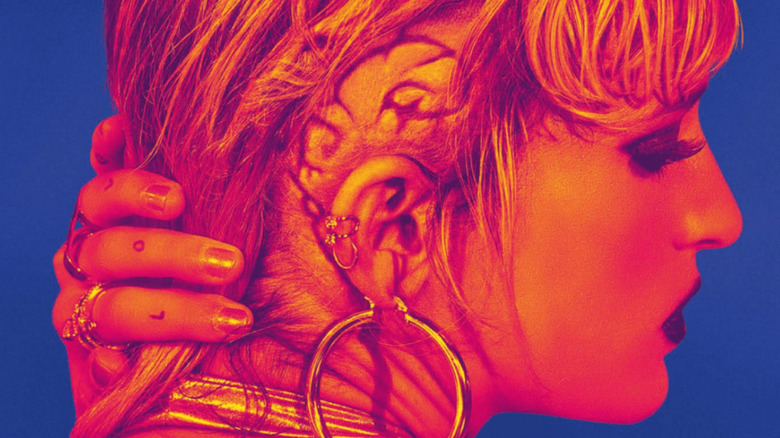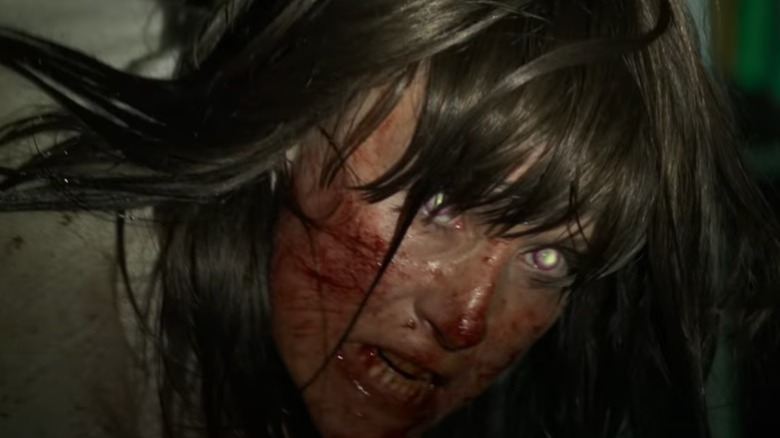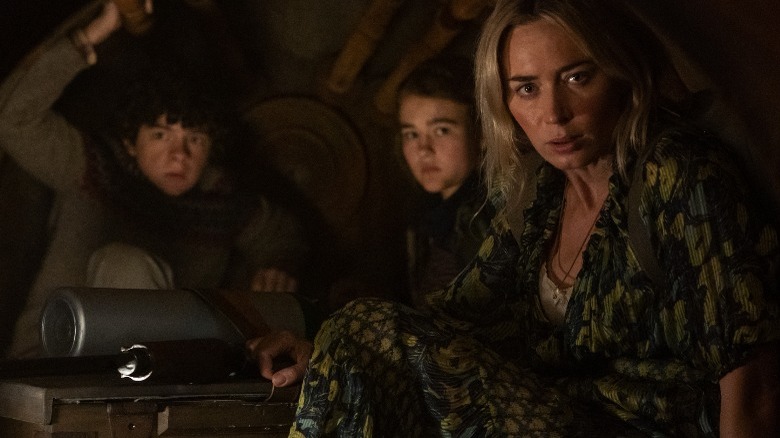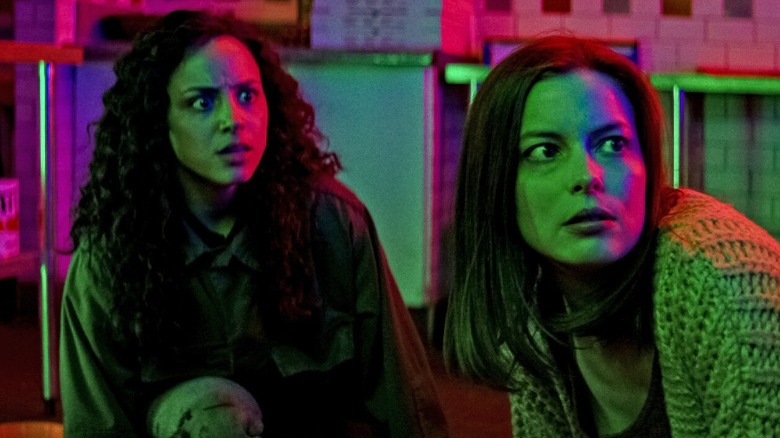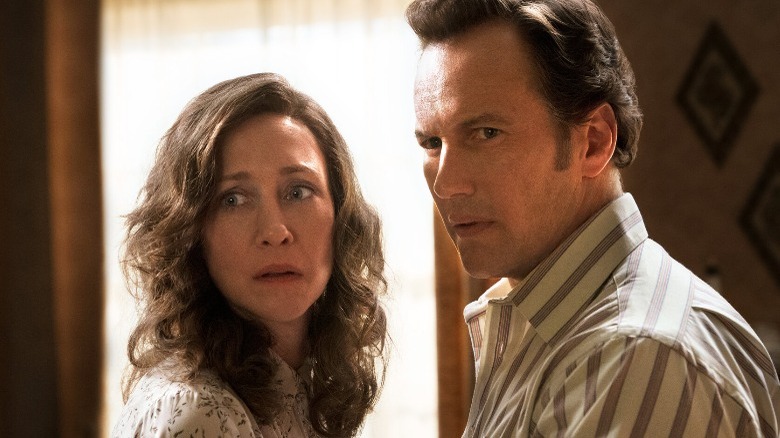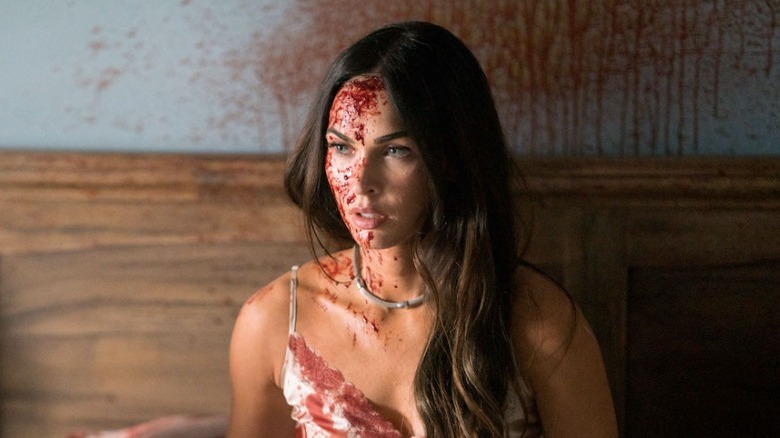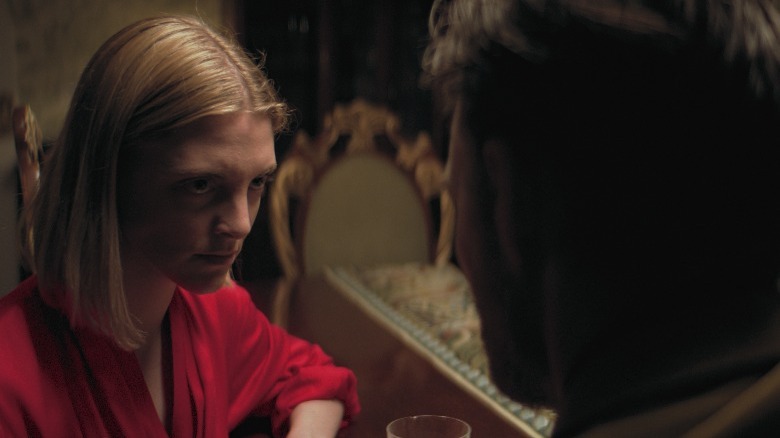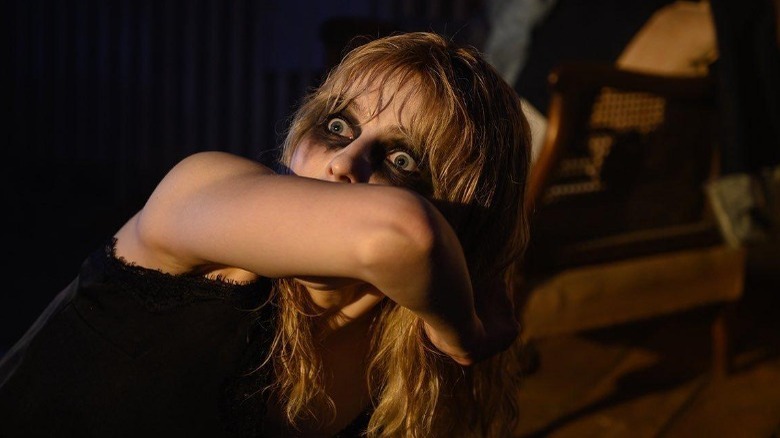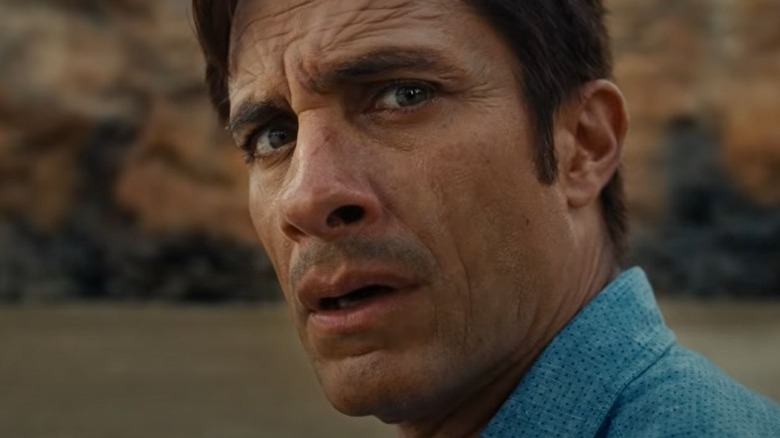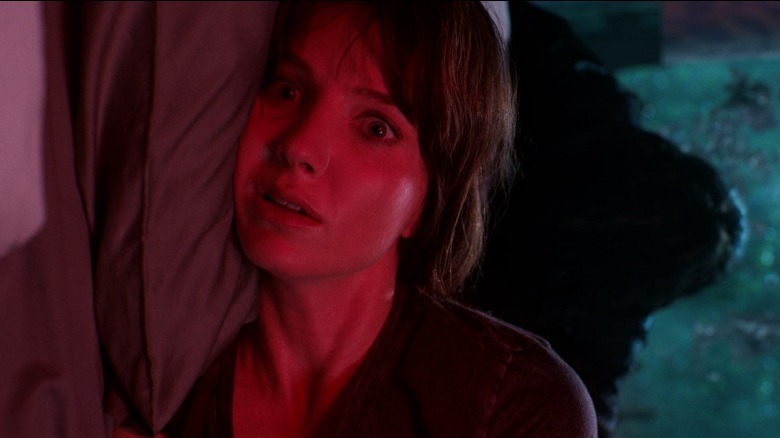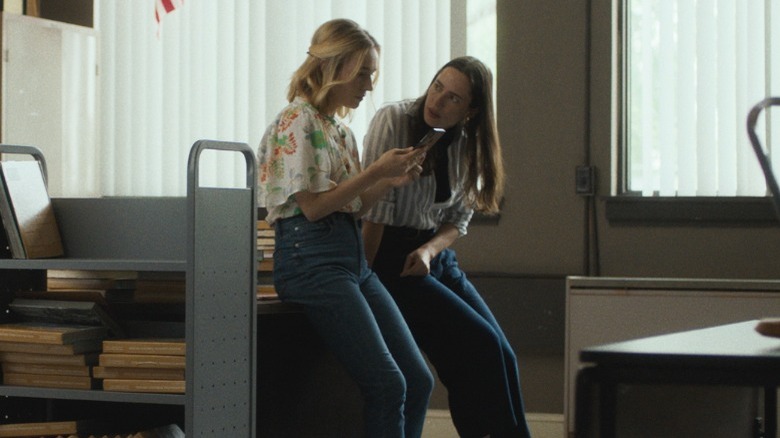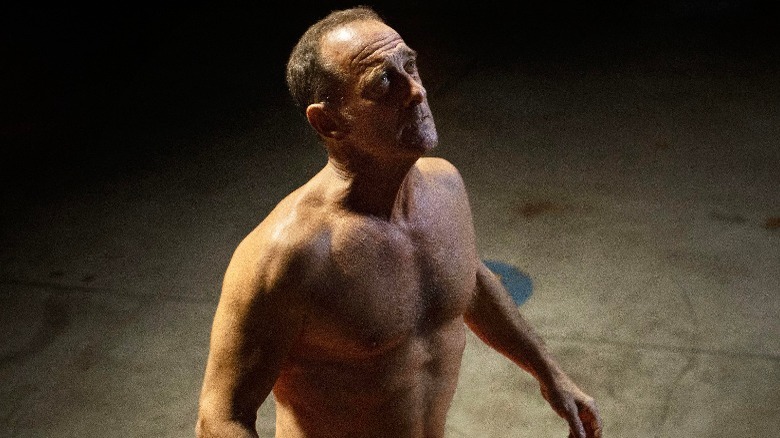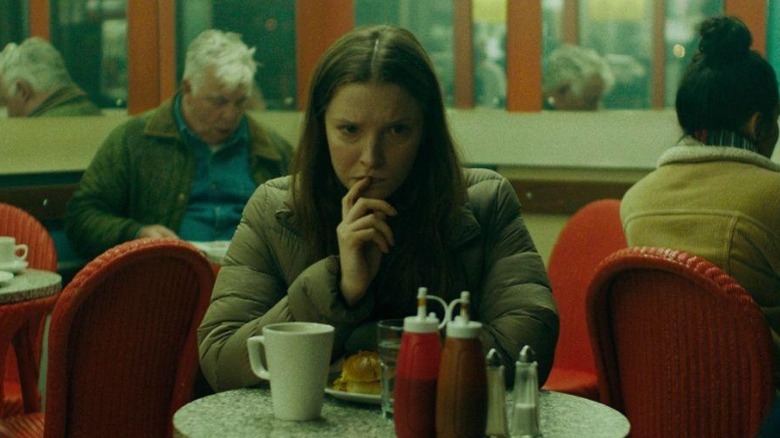The 12 Best Horror Movies Of 2021, Ranked
Horror has long been one of the categories that falls firmly under the "genre" label, a set of constraints that set these types of films apart from those that are considered more "serious." This is obviously silly; there are great films within all genres, with horror being no exception. Still, as the medium has aged and terms like "elevated horror" have started to pop up, wider audiences have developed a new appreciation for these types of narratives, granting them the critical acclaim the genre has always deserved.
This year's batch of horror films exemplify much of what's going on with the genre nowadays: They're a bit quieter than the slashers of the '80s, and have picked up on recent trends — there's plenty of family drama, trauma, and personal journeys to be explored here, all of which have long been fruitful grounds for frightening narratives.
There may still be a long way for the horror genre to go in terms of visibility, however, which is why we've decided to make the list below, which honors a dozen of our favorites and highlights some of the year's best horror gems — whether they lean more towards the commercial, the independent, or just flat-out B-movie greatness.
12. Blood Red Sky
"Blood Red Sky" feels like it was made by grabbing a bunch of random concepts and mashing them together, with muddled but entertaining results. This German film follows Nadja (Peri Baumeister), a woman who boards a plane alongside her son, Elias (Carl Anton Koch). From the get-go, she's clearly stressing over something, and carefully carrying small bottles of some undescribed medicine. When a terrorist group hijacks the plane, Nadja's secret — not too much of a spoiler to say that it's something bloody; this is a vampire movie — comes out, and at that point the film becomes an even more nightmarish experience.
"Blood Red Sky" has a lot going on at once. While the action is at times static, trapped by its circumstance, it's a refreshing take on the vampire genre, one born from a terrifying concept. What "Blood Red Sky" loses in script and story, it makes up for in some truly spooky vampire makeup. And lots of blood, of course.
11. A Quiet Place Part II
Picking up right where "A Quiet Place" left off, "A Quiet Place Part II" follows the remainder of the Abbott family. As someone who wasn't a fan of the first film, I was excited to see this sequel dig deeper into its mythology and sound-sensitive world. "Part II" connects our heroes with a horde of interesting and complex characters, primarily Emmett, a guy the family used to know back when the world was a habitable place. Portrayed by Cillian Murphy with an intriguing enigma and the actor's trademark duplicity, his character is a role typically seen in stories like "The Walking Dead" and "The Last of Us," instantly adding a kick that revitalizes and adds something new to this story.
Overflowing with tension while comparatively light on plot, "A Quiet Place Part II" leaves the franchise in a perfect spot for another sequel, and hands the reins off to its younger cast members (who deliver a pair of well-crafted performances that'll have you rooting for them until the very end). It's a more hopeful film than its predecessor, with a quick and punishing pace that will have you on the edge of your seat.
10. The Fear Street Trilogy
The "Fear Street" trilogy is a Netflix production through and through. Despite some bloating and pacing issues, it's ultimately fun and inventive, having a palpable love for the horror genre. The story follows the curse of the town of Shadyside, which dates back to the year 1666, when Sarah Fier was labeled a witch and burnt at the stake. As the centuries pass, Shadyside's residents succumb to crime and tragedy, while those who live in its neighbor town thrive.
The first film picks up in the '90s, when Deena (Kiana Madeira) and her friends start to get stalked by a mysterious killer wearing a skull mask. Each film travels back in time, with part two set in the '70s, and part three set in the year 1666, with each entry revealing a piece of the puzzle. It's an incredibly ambitious project that works well considering all of the content that it's juggling and while you can't help but compare it to the leaner slashers it's referencing, "Fear Street" has heart and a lot of love for its characters. While it might not be Leigh Janiak's best work (that spot is left for her disturbing "Honeymoon"), "Fear Street" was one of the highlights of my summer.
9. The Conjuring: The Devil Made Me Do It
The "Conjuring" universe has become one of the most exciting and reliable film franchises. While some entries are better than others, the ones featuring Patrick Wilson and Vera Farmiga are consistently intriguing, with the actors feeding off of each other's performances and showing just how well they know these characters. "The Devil Made Me Do It" is the third installment of their series, and while it shows a bit of its age and suffers from the fact that it's not directed by James Wan, it remains a scary treat for fans and newcomers alike. It follows Ed (Wilson) and Lorraine (Farmiga) as they investigate a murder, with the man responsible claiming to have been possessed by a demon.
The "Conjuring" films are primarily concerned with demonic possessions, a subgenre of horror that's tough to crack yet invigorating when done correctly. By mixing things up, the "Conjuring" universe continues to keep things fresh, pushing their stories in new directions and reintroducing Wilson and Farmiga whenever things need a steady hand.
8. Till Death
"Till Death" marks Megan Fox's return to the horror genre, and while it's by no means perfect, it is pretty fun, and intelligently uses Fox's skillset to its benefit. The film follows Emma (Fox), a woman who appears to be bored and unhappy in her marriage and who's just ending an affair. When she and her husband Mark (Eoin Macken) depart to a secluded lake house to celebrate their 10th anniversary, Emma ends up handcuffed to his dead body. Then some men show up to murder her, and Mark's twisted plan is unveiled.
"Till Death" is tightly plotted, benefitting from the added spotlight Fox has been experiencing lately. It also shows how much Fox thrives when working in genre films, especially those that allow her to use her natural iciness and deadpan delivery. "Till Death" is no "Gerald's Game," but the script (written by Jason Carvey) is smarter than you'd expect, expanding on its limiting premise without straining.
7. Bloodthirsty
If you've ever wished for a movie about a gay singer-songwriter battling lycanthropy, well, boy do I have a recommendation for you. "Bloodthirsty" follows Grey (Lauren Beatty), an on-the-rise pop singer who gets invited to work alongside Vaugh Daniels (Greg Bryk), one of the industry's leading producers. After moving into his remote cabin in the woods and unsuccessfully trying to make new music, Vaugh begins to push Grey, suggesting she go off her meds in order to make music that is more real. Suddenly, Grey starts craving red meat and fantasizing that she's transforming into a wolf.
There's a scarcity of good werewolf films, a sub-genre that can be a great metaphor for transformation and expressing primal instincts without being too on the nose about it. "Bloodthirsty" is most similar to "Ginger Snaps," using werewolves as metaphors for femininity. Surprisingly, it's also equipped with a robust soundtrack, with Grey's songs elevating the film and taking it to surprising places. I wouldn't call "Bloodthirsty" a musical, exactly, but it might be the first werewolf movie with an integral musical presence. That's enough of a reason to watch, in my opinion.
6. Last Night In SoHo
"Last Night In SoHo" is as stylish as anything Edgar Wright has ever done. While his work has long been invested in the gadgetry of filmmaking and the possibilities behind making impossible-looking shots, his fixation has never been more apparent than in "Last Night In SoHo." There's a beat in almost every sequence where you ask yourself how the shot you're looking at was achieved.
Not strictly a horror film but with enough scares to land it on this list, "Last Night In SoHo" revolves around Eloise (Thomasin McKenzie), a young fashion designer who just moved to London to study her craft. Feeling perennially out of place (a skill that McKenzie perfectly embodies), her life takes a turn when, every night as she falls asleep, she visits the '60s and embodies Sandie (Anya Taylor Joy), a stylish wannabe singer who seems to have everything Eloise desires.
"Last Night in Soho" is bursting with ideas, and tries to wrangle enough of them that it ends up wobbling a bit under its own weight. But while it's clearly more concerned with the look and craft of filmmaking than with the narrative itself, it's ultimately gutsy, beautiful, and unlike anything I've ever seen.
5. Old
The premise of "Old," silly as it undoubtedly is, is worth the ticket price alone: A family goes to a beach that makes them grow old. As the years pass within minutes, we see babies become teens, preteens become adults, adults grow into seniors and diseases quickly trigger shocking and terrifying deaths.
"Old" has a premise that instantly makes you wonder how the film will end ... and whether the director will stick the landing. M. Night Shyamalan, a filmmaker who has often seemed more concerned with the ride and the twists therein, makes "Old" something ingenious and cinematic. It's a film made by a director who's done his homework, who knows where to place a camera for the best and most memorable effect.
"Old" is a delightful body horror romp, making you cringe and squirm while exhibiting a surprisingly keen understanding of death and loss. I found it immensely resonant as a film to watch in the midst of a pandemic, illustrating how painful the passage of time can be and highlighting how important it is to treasure the ones you love while they're still around.
4. Malignant
"Malignant" follows Madison (Annabelle Wallis), a woman who starts having terribly vivid dreams that end up coming true. Following a head injury, Madison wakes up to find her husband (Jake Abel) gruesomely murdered inside their home, kicking off a string of violent murders that sets off an investigation to which she is intrinsically linked.
Directed by James Wan, the man behind horror greats like the "Saw" franchise and "Conjuring" universe, "Malignant" is amongst his most fun and visually dynamic efforts. Through bravado and inventiveness, Wan makes everything in "Malignant" work; muddy acting, dubious musical cues, and loose ends all feel like a part of his grand scheme. The action is engaging, with clever gags punctuating its every beat, and the film's main twist literally made me scream. It's the type of movie that was made to be seen in theaters, where the audience becomes one living organism sitting at the edge of their seats, anticipating the next scare ... or wild twist.
3. The Night House
"The Night House" follows Beth (Rebecca Hall), a teacher reeling from the unexpected suicide of her husband (Evan Jonigkeit). As she drowns in her own pain and self-pity, she starts searching for traces of her husband everywhere, going through old videos and photos as a way of staying connected. Down this rabbit hole, she uncovers strange things (images of women that look eerily like her, books on the occult) which suggest that she may not have her husband as well as she thought she did. Hall, as usual, inhabits her characters with a refreshing unfussiness. They may be going through the worst moment of their lives, but they're active participants in their stories.
"The Night House" is a sparse movie, something that works in its favor. Its slow pace multiplies its scares and allows the film to grow thick with tension. Like a lot of horror films — particularly the more cerebral ones that deal with topics like death and trauma — "The Night House" tries very hard to make all of its pieces fit, to make sure every loose end is tightly knotted. By the time the third act kicks in and every development is being explained, the strength of its strong opening act gets a bit reduced. Still, it's a great film with a towering lead performance.
2. Titane
"Titane" is a great example of a horror film that goes beyond the genre, only to land somewhere else entirely. Partly a family drama and completely a body-horror experience, "Titane" follows Alexia (Agathe Rousselle), a woman who has no interest in other people. At the start of the film, it seems like Alexia enjoys nothing aside from dancing atop cars.
The film kicks into high gear when Alexia is forced to go on the run, upon which time she meets Vincent (Vincent Lindon). The two form a relationship out of necessity that resists easy categorization. Featuring beautiful performances from Agathe Rousselle and Vincent Lindon, "Titane" is an insane film with a simple heart; despite its edges, it's a story about connections made in unlikely places and finding people who see you for who you really are. While it features some gruesome and nightmarish shots, what lingers most about Julia Ducournau's film are its simple images: characters dancing and smiling, allowing themselves the chance to be happy and letting others in.
1. Saint Maud
Due to COVID-19 fallout, "Saint Maud" originally arrived in the UK back in 2019, and only made it to our shores earlier this year. This gives me all the excuse I need to add it to this list and argue why it's the best horror film of the year.
The story follows Maud (Morfydd Clarke), a hospice nurse who recently experienced a spiritual awakening. Desperately looking for jobs, she is charged with caring for Amanda (Jennifer Ehle), a retired dancer with late-stage cancer. When she sees the way Amanda lives — smoking, drinking, paying a woman to have sex with her — Maud develops an obsession with saving her soul.
"Saint Maud" has characters whose actions could be interpreted in a variety of ways: Amanda seems entranced by Maud, jealous of her youth and beauty but pitying of her religious devotion, while Maud appears to admire Amanda and her accomplishments while also seeming disgusted with her. Morfydd Clark makes Maud's character work by allowing every possible explanation to exist within her performance — Maud could be a prophet, yes, but she could also be delusional.
"Saint Maud" is economical with its scares. It takes time to unfold and is bone-chilling when it finally unravels. The ending made me think of that primordial storytelling principle: Perfect endings are surprising, yet inevitable. "Saint Maud" understands this completely.
